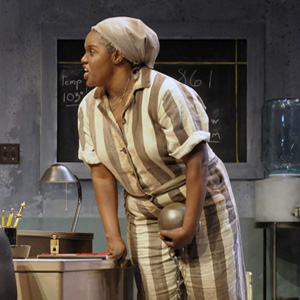In the ’60s, many musical artists discovered they could take old blues songs and electrify them; giving them a more “rock” sound and more boogie. Cream covered Robert Johnson, Led Zeppelin covered Willie Dixon and so forth. Problems arose with the intellectual property of the songs. Was it exploiting these songs for personal gain? Or just bringing forgotten music to the masses?
That’s the question at the heart of Frank Higgins’ Black Pearl Sings, the two-woman, two-act musical drama at the San Jose Repertory Theatre.
Set during the Great Depression in the early 1930s, Susannah (Jessica Wortham) is a stiff, staunch and white ethnomusicologist for the Library of Congress. She’s ambitious about getting a teaching job at Harvard, so she travels from prison to prison to find black singers to record songs that date back “before slavery times.”
While in Texas, she meets Pearl Johnson (Jannie Jones), a poor inmate serving a 10-year sentence because she cut off a man’s, er, member. The unlikely duo has a vested interest in helping one another and strike a deal. Pearl will sing and let Susannah record the old songs that could boost her career only if she helps Pearl get a parole hearing. We find out Pearl has a 22-year-old daughter she hasn’t heard from and desperately wants to find her, fearing the worst.
The chemistry between Worth and Jones is engaging, even when the dialogue can seem drab. Worth delivers an ambitious Susannah, a feminist bent on making it in a world mostly run by rich old white men. We can laugh at her stodgy rigidness, but can’t help but fall for her bohemian progressive ideals.
There are comedic moments throughout the play that work and the set design is beautiful, but the real standout is Jones’ voice. She belts out call-and-response and old railroad songs with such ferocity, authenticity and pain that you’d think she was plucked right out that time period. She just doesn’t sing the songs, she feels them.
It’s well documented how white people have basically screwed over African American artists in the past; some have never gotten their proper due. In that aspect, Higgins is probably preaching to the choir. We can all shake our heads and say, “Well, that was wrong.” (But Higgins is also a white man making his own art out of the African American experience—see how complicated it gets?) However, by the end of the play, there’s a feeling of unity rather than racial division—that when it comes down to it, we’re all basically the same.
Black Pearl Sings
Runs through Sept. 26 at San Jose Rep

 West Coast SWAT Teams Converging on San Jose
West Coast SWAT Teams Converging on San Jose  Banh Xeo: A Vietnamese Treat
Banh Xeo: A Vietnamese Treat 


